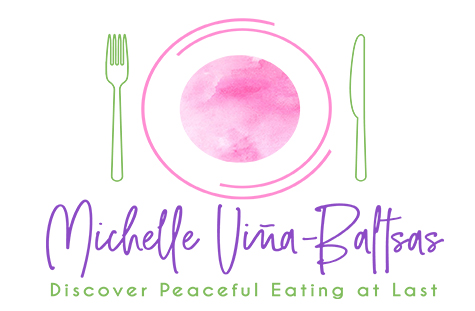Q: Is it possible to intentionally work towards losing weight while intuitively eating?
A: Isn't this the million-dollar question?
One of my followers was being stigmatized by her doctor to lose weight for "medical" reasons asked me this question in the No Diet Sisterhood. In truth, I get this question a lot and read it often on social media.
You've probably guessed it, but the answer is NO, and here's why.
Based on my extensive and ongoing (let's hear it for life-long learners!) professional training as a Certified Intuitive Eating Counselor and body image coach and from my decades-long battle with food, I can say with certainty that intentional weight loss clouds judgment and prevents people from eating according to their body's cues because they fear it will affect their weight.
When intentional weight loss is the goal, choices are made based on caloric/macro/micro content, etc., and not on the body's cues. Since intuitive eating is all about giving ourselves full permission to eat so that we can discern what foods feel best in our bodies, etc. making intentional weight loss a part of this process is not intuitive. If weight loss happens naturally as a result of listening to the body, that's entirely different.
While a foundational goal of intuitive eating is to become more flexible with eating, another is also to do so in accordance with one's hunger/fullness cues, satisfaction, digestion, etc. The principles can seem fundamental to the naked eye, but when it comes to actually integrating them into everyday life, they can get quite emotionally complex. This is why so many fall back into diet mentality and don't even realize it. This is especially true when people are stigmatized and told to lose weight for "medical" reasons.
The belief that you need to lose weight to be healthy isn't valid and the Health At Every Size (HAES) movement is based on this research. Whenever intentional weight loss is the goal there is restriction. Bingeing and eating for comfort (aka "emotional" eating) often increases when there is even the slightest detection of restriction. So whether there is emotional restriction (guilt, worry, shame, rules, etc.) or physical restriction (counting, "forbidden" food, etc.) disordered behaviors around food will continue. There is just no way around and if you're like most of us who have struggled with food for some time, your history reflects this.
While higher weights may be correlated with certain illnesses, they are not necessarily the cause of them. Fat activist Ragen Chastain breaks down the research on this often in her blog Dances with Fat.
Beware. There are many who are trying to co-opt intuitive eating and turn it into another weight loss plan or "lifestyle". If you are following any intuitive eating professional who is even hinting that you will lose weight with intuitive eating or is saying that [X] type of exercise will change your body shape/size, or giving specific instructions about "healthy" vs. "unhealthy" foods, unfollow them as they will do more harm than good for you.
Intuitive eating (and HAES) is not and never will be about weight loss. True intuitive eating is about healing a relationship with food, body image and rediscovering movement that's not tied to weight loss. Period.
Struggling with this? I bet coaching can help! Let's connect for a FREE connection call so you can get the support you need and stop struggling so much.

